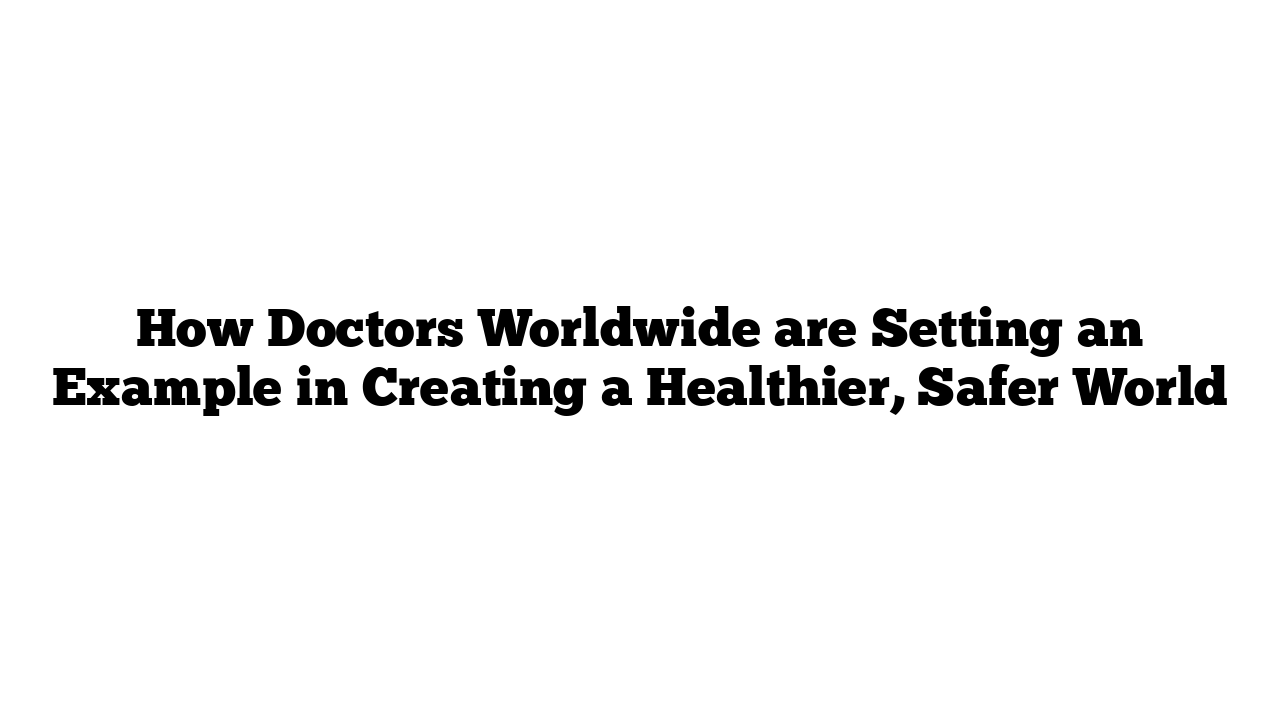Doctors around the world are not only dedicated to treating patients but also to fostering a healthier, safer, and more compassionate society. By setting examples in public health, disaster response, and humanitarian efforts, doctors continue to lead positive change worldwide.
1. Pioneering Public Health Initiatives
Doctors play a crucial role in public health initiatives, working to prevent diseases before they start. For example, in the USA, public health campaigns led by physicians have raised awareness of smoking risks, diabetes prevention, and mental health care. These efforts often involve direct patient education and advocacy for healthier lifestyles.
- Impact of Public Health Initiatives: By focusing on prevention, doctors help to lower the overall burden on healthcare systems, creating long-term benefits for individuals and communities alike.
- Example: In countries like Japan, doctors have worked on initiatives promoting healthy eating and active lifestyles, contributing to Japan’s high life expectancy and low obesity rates.
2. Promoting Hygiene and Sanitation in Developing Nations
Doctors contribute to community sanitation improvements worldwide. This work is essential, particularly in low-income countries where access to clean water and sanitation remains a challenge.
- Example: Doctors Without Borders (Médecins Sans Frontières) operates globally, promoting clean water access and basic sanitation to reduce infections and improve community health.
- Local Impact: In countries like India and Kenya, healthcare professionals have led hygiene and sanitation projects that reduce the spread of preventable diseases such as cholera and typhoid.
3. Advocating for Mental Health Awareness
Mental health awareness is essential to public health, yet it remains stigmatized in many parts of the world. Doctors are at the forefront of changing attitudes, ensuring mental health care is given the same importance as physical health.
- Example: In Canada, mental health programs focus on destigmatizing mental illness. Canadian doctors often partner with schools and community organizations to provide education and early intervention programs.
- Global Impact: Initiatives like World Mental Health Day, backed by healthcare professionals, raise awareness and increase acceptance globally, emphasizing that mental health is an integral part of overall wellness.
4. Responding to Natural Disasters
When natural disasters strike, doctors are some of the first to respond. They provide emergency medical care, organize relief efforts, and establish makeshift hospitals.
- Example: After the 2010 earthquake in Haiti, doctors from across the world, including the USA, worked tirelessly to provide medical care, support rehabilitation efforts, and rebuild healthcare infrastructure.
- Importance: Swift medical responses during natural disasters save lives and help communities begin the healing and rebuilding process.
5. Promoting Vaccination and Preventive Care
Vaccination is one of the most effective ways to prevent diseases and protect public health. Doctors globally champion vaccination campaigns, ensuring life-saving vaccines reach every corner of the world.
- Example: In Africa, doctors have led efforts to eliminate diseases such as polio and measles through comprehensive vaccination campaigns supported by the World Health Organization.
- Impact of Vaccination: Through these efforts, doctors are creating safer, disease-free communities and are close to eradicating diseases that once claimed millions of lives.
6. Leading Research and Innovation in Medical Science
Doctors and researchers are at the heart of groundbreaking medical discoveries, advancing treatments and developing new medications.
- Example: Doctors in Germany and Japan lead research in regenerative medicine and cancer treatment. These advancements not only save lives locally but also set new standards for healthcare worldwide.
- Why It Matters: Through research, doctors continue to push the boundaries of medicine, ensuring that patients around the world have access to the best possible treatments.
7. Supporting Humanitarian Efforts in Conflict Zones
In areas affected by war and conflict, doctors provide essential care to those who need it most, often at great personal risk. Medical teams provide trauma care, perform surgeries, and offer psychological support to survivors.
- Example: Doctors in organizations like the International Committee of the Red Cross work in countries experiencing conflict, such as Syria and Yemen. Their work includes setting up field hospitals and providing urgent care.
- Lasting Impact: These humanitarian efforts demonstrate the global solidarity within the medical community, showing the commitment of doctors to aid those in crisis, regardless of borders.
8. Educating Communities on Preventable Diseases
Through education, doctors empower individuals to make informed choices that benefit their health.
- Example: In Australia, doctors have taken a lead in educating communities on skin cancer prevention, due to the high levels of UV exposure. Through campaigns and school programs, they’ve instilled habits of sun safety that have led to significant reductions in skin cancer rates.
- Global Impact: Education by doctors in areas like nutrition, hygiene, and disease prevention helps to build a healthier, more resilient global population.
9. Developing Telemedicine and Remote Care
In recent years, telemedicine has become essential for providing healthcare in remote areas, especially during the COVID-19 pandemic. Doctors have embraced this technology to make healthcare accessible to more people.
- Example: In the USA and India, doctors use telemedicine platforms to reach rural and underserved areas. This approach reduces travel time for patients and provides timely consultations.
- Impact of Telemedicine: By using technology to bridge geographical gaps, doctors are improving access to healthcare, particularly for vulnerable populations.
10. Partnering with Global Health Organizations
Doctors collaborate with organizations like the World Health Organization and UNICEF to address global health issues such as malaria, tuberculosis, and malnutrition. These partnerships are instrumental in launching large-scale health programs.
- Example: Efforts to combat malaria in Africa have been greatly supported by doctors who work with WHO to distribute bed nets, provide preventive treatments, and educate communities.
- Outcome: Through partnerships, doctors extend their reach and amplify their impact, contributing to a safer and healthier world.
Doctors worldwide are setting powerful examples, showing that medicine is not only a science but also an art of compassion. Their commitment to healing, innovation, and humanitarian work makes them champions in creating a safer and healthier world for all.
For more insights on the role of doctors in public health, visit MedicalTimes.io.
